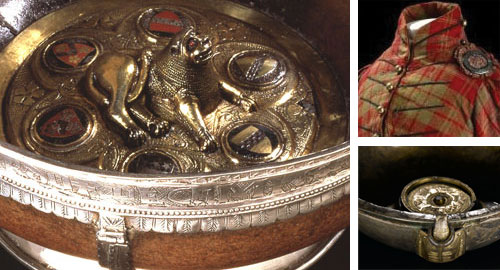Last year at the V&A, the writers’ collective 26 did something extraordinary. We created (quite unknowingly) a new literary form. During London Design Week 26 of our writers responded to 26 objects in the British Galleries in exactly 62 words. We coined a name for this new literary form: a sestude, which is a reflective study in exactly 62 words. 62 by 26 – it was a great idea and it is no real surprise that the concept for the original 26 Treasures exhibition lent itself brilliantly in 2011 to other exhibitions around the UK. We’re delighted to say we’ve exhibited this year in the National Library of Wales, the Royal Ulster Museum and here in Scotland at the National Museum (which we’ve loved).

Now, in a further extension, we aim to publish the world’s first-ever collection of sestudes. This will be done through a new publisher Unbound. Unbound is an online initiative by John Mitchison, the creator of QI. The Unbound concept is not really a new one in publishing. Robert Burns, after all, invited his friends to subscribe so that his poetry could make it into print. Unbound works in the same way – though of course with the advent of the internet, subscriptions can come from anyone, anywhere. It’s already worked for other writers – Terry Jones’s book was the first Unbound project to receive full subscription in spring 2011 and since then several others garnered enough support to make it into print. For each book the principle is the same – the book is produced only when or if it reaches its funding target within 90 days.
This is as democratic a form of publishing as anyone could wish for and, of course, I’d like you to support the publication of the 26 Treasures book. It’s a book that deserves to be published because it deserves to be read. It brings together writers of different disciplines: different ages, backgrounds and experience; the famous and the not-so-famous. Andrew Motion, Michael Longley, Alexander McCall Smith, Gillian Clarke. And another hundred writers. I’ve often wondered if we removed the names from some of the pieces if people might not be able to tell who was famous and who was not. That interests me and it shows, I suppose, that what unites the collection is the quality of writing inspired by the emotional connection found with an ancient object.
That’s what makes the collection special for me. Despite last month’s news that the number of visitors to museums has doubled in a decade, our experience of visiting museums can all too often be described as a ‘passing relationship’. We see an object, we might register its period or usage, but we pass on without a deeper thought, without a smile, a shudder or a tear.
26 Treasures is a way to remedy that. It gives us all a more personal way of responding to treasures from the past. Museums are there not to display history like flies in amber but to help us all find the human links between past, present and future and our 26 writers have given each object a distinctive and compelling voice.
So I ask you to support this book. It will be produced only if enough of you take out a subscription at http://www.unbound.co.uk/books/26-treasures. Subscriptions start from £10 for an ebook and £18 for a hardback. In return you will receive a beautifully designed book to treasure and you’ll be supporting a new literary form and the joy it’s brought by connecting museum audiences and their emotions with objects from some of our most precious national collections.
